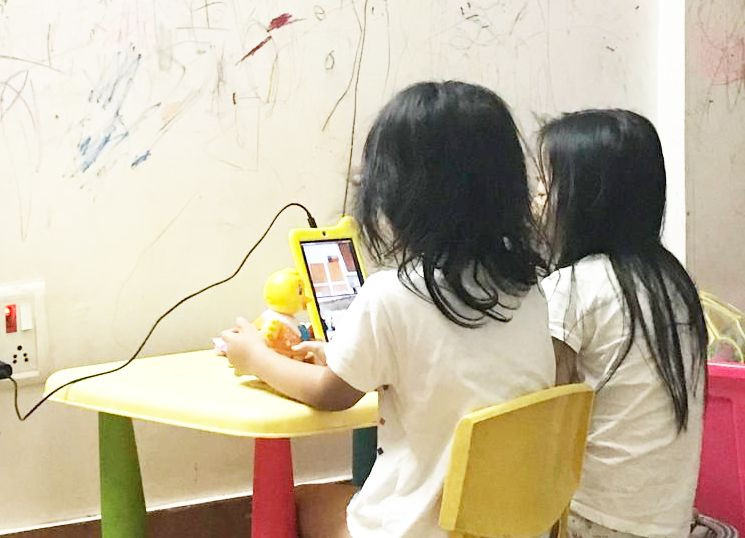Kindergarten students Grace and Ruth attend an online class session earlier in October. The Government of Nagaland had on October 26, allowed reopening of schools for Classes 1-4 in rural areas while authorising the district task forces to take decisions on the same in urban areas. (Image for representational purpose)

Merina Chishi
Dimapur | November 2
As schools for primary sections finally open, many parents are breathing a sigh of relief. The closure of schools for nearly two years has not only hampered children’s education but has caused immense psychological and emotional distress for both students and parents. Many parents fear that the damage is already done and trying to reverse the situation is going to be a very difficult task.
Losing focus and interest in studies
As a Montessori trained teacher, Likivi thought that assisting her 6-year-old son with his studies would come easily. But the task proved to be more difficult than she anticipated as her son was not focused on his studies. “As a parent I was not satisfied only with online classes and so I tried to supplement in teaching him but he isn't attentive at all and constantly tells me that his class is over for the day. I'm afraid that he hasn't learnt as much as he should have,” she says.
On the other hand, a class 2 student who is repeating the same class has not made an improvement in her academics and her mother is uncertain whether her daughter will be able to catch up in the next standard. She says, “Last year it was just pre-recorded videos and assignments and she couldn't cope up so we made her repeat. Unfortunately, the situation was back to square one and now I am really worried about my daughter.”
Apart from such problems, the level of competitiveness among children has also drastically come down. Most children are aware that there is no need for competition like other times and this trend has affected not just average students but also those who, by nature, are competitive in academics as well as other school activities.
Gadget addiction
Gadget addiction is perhaps one of the most negative impacts of the COVID-19 lockdown and a problem that almost all parents are facing. Children as young as 3 and 4 years old are addicted to smart phones and parents have no way of getting them off it. Some parents like Sana, who is a working mother of 3 children, express helplessness with the situation. “It is impossible to keep three children confined to the house the whole day. The phone and television are the only two things that allow me to work at home and go to office,” she expresses with regret.
Setbacks on social and emotional learning
Due to disruption of their studies and other extracurricular activities, many children have started exhibiting negative behaviour at home. Aggression, anger, tantrums and answering back have become a major problem in many homes. Discipline, manners and other life skills that they inculcate in school has taken a back seat and Sana says, “We have gone back by 2 to 3 years as far as social and emotional learning is concerned.”
Currently, children and parents are going through a bad phase—children unable to cope with restrictions and parents trying to set things right. So while schools are making it optional for students to attend classes, most parents are not holding back from signing the ‘letter of consent’ to allow their wards to get back to school.
As clinical psychologist and counselor Lobeni Kikon says, “Peer relationships and communication provide a unique context to allow children to learn a range of social emotional skills like empathy, cooperation, problem solving, etc which is needed for the overall development of a child. Going back to school and engaging with their friends and peers is definitely going to help children as well as parents.”






